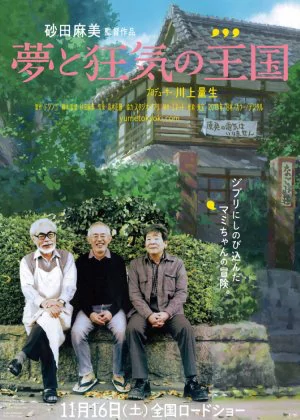The Kingdom of Dreams & Madness

Watches
July 07, 2014
Ghibli fans, take notice! Yume to Kyoki no Ohkoku isn't the first documentary to dedicate its time to the wondrous world of Japan's most famous animation company, but it is by far the most honest and direct one I've seen so far. No walking away feeling as if you've just been subjected to a promotional video or document of hype, instead you get a very good feel of what it's like to work with and for a director like Miyazaki.
Ghibli has a majestic reputation. It's often compared to companies like Disney and Pixar, featuring a 30-year track record without any critical low points. Even though different people have different favorites, it's generally believed that there are no obvious flukes in the Ghibli catalogue. But that's where the comparison ends. Where companies like Pixar (and by extension, Google and Apple) like to pretend they're a playground for their employees (appearing as cool and liberal as possible), Ghibli is still a very small, humble and down-to-earth company. It's an anomaly, a company that should not be able to exist according to modern economic laws, yet to get a taste of exactly that is pretty awesome.
Sunada follows Hayao Miyazaki during the entire production process of Kaze Tachinu. She is given access to the Ghibli studios, but she's also invited to visit Miyazaki at his home. In the meantime, Sunada hooks up with Toshio Suzuki (the famous Ghibli producer) and Isao Takahata (the yang to Miyazaki's yin) to try and get a broader view of the company. Through these different eyes you get a pretty solid idea of what it means to work for one of the best animation houses in the world.
In essence Yume to Kyoki no Ohkoku is a pretty simple documentary. There's not much that will draw the attention of people not familiar with Ghibli's magic, but that's where the true wonder lies. The idea of a company that is revered around the world for its quality animation is hard to match with the small scale and subdued, familiar atmosphere you get to see in this documentary.
Miyazaki's attention to detail, his dated beliefs, his honesty when talking to and about others, his little quirks and rituals (like going to the rooftop garden of the studio to watch the sun set with the rest of his crew) are simply amazing to behold. Sunada deserves praise for documenting everything without wanting to add extra weight or polish. In that sense this would be a good companion piece to Jiro: Dreams of Sushi, as both subjects share a humbleness and dedication to their job that's almost impossible to imagine in the West.
I wouldn't recommend watching this doc if you haven't got a clue what Ghibli is or which films Miyazaki has made, but Ghibli fans get a rare and honest glimpse behind the doors of one of the greatest animation houses in the world. I wish more documentaries like this existed.